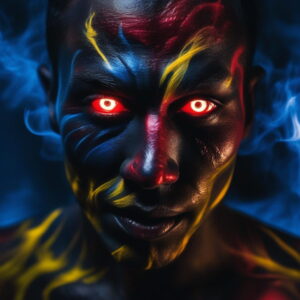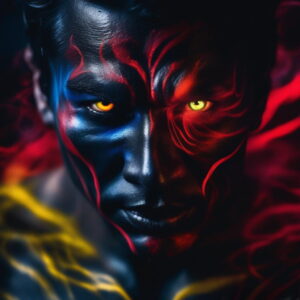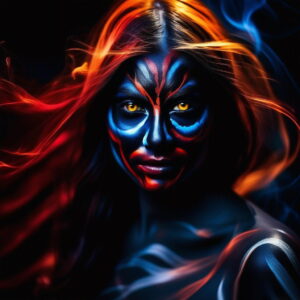



One of the most widely misunderstood races in the Universe from a human perspective, Demons have a specific role in the pantheon of beings. Often, they play the antagonist to the hero in order for them to grow and develop. Some believe that these once were Angels that joined Lucifer’s rebellion or corporeal beings that have lived exceedingly malevolent lives.
In Buddhism, Mara is a malignant demon who tried to prevent the Buddha from achieving enlightenment. The name Mara means “causing death” or “killing” in Sanskrit. Mara is associated with death, rebirth, and desire. He is seen as an embodiment of unskillful emotions like greed and hatred.
Some Buddhist texts describe Mara sending his three beautiful daughters – Craving, Discontent, and Passion – to tempt the Buddha and obstruct his path to enlightenment. The daughters are personifications of spiritual obstacles. But according to these versions of the story, the daughters came to the Buddha willingly, even after Mara failed to stop the Buddha’s quest on his own. The Buddha is able to resist the allure of the three daughters, who “glitter with beauty.” He remains unmoved, like the wind sweeping away a fallen tuft of cotton. The daughters’ attempt to seduce and entice the Buddha ultimately fails leading to the Buddha’s enlightenment.
In computer language a “Daemon” is a program that runs in the background without the knowledge of the user. These are essential to the operation of the system and they go on completely undetected – until someone looks under the hood of the machine and goes into the logs that is.
In a similar way Demons act on our consciousness without our awareness. Often, they come in the form of addictions. Full on Demon possession can occur in addicts, for example. They will appear as shadowy beings that grimace spectrally in the faces of those afflicted. In normal states of consciousness, these can’t be seen. It often takes someone strongly psychically attuned to see them. Solar eclipses bring possessed people out in force. You may notice an increased police presence during those celestial events, when parts of the world go dark.
Alcohol is known as the “Demon drink” for good reason. Another playful moniker is “Lucifer’s brew”, as alcohol can literally bring out the devil in you. Only in high quantities though, moderation is totally fine and those that do enjoy a nice tipple need to learn to find the right balance.
In ancient Greek religion and mythology, daimons were lesser divinities or spirits that mediated between gods and humans. The word daimon comes from the Greek root meaning “to divide” or “distribute destinies”. Daimons guided, motivated, and inspired mortals, serving as tutelary deities and guardians. But they were distinct from the Olympian gods, representing a more abstract divine force.
Described as “great and powerful figures,” daimons were honored after death and offered protection to the living. According to Hesiod’s myth, Phaëton became an incorporeal daimon after his demise. And in the Golden Age, Zeus transformed people into benign daimones to serve and enrich mortal men. Shrines allowed daimons of venerated heroes to localize while still acting as beneficent spirits.
Socrates spoke of an inner daimonion that gave him wisdom and warned against mistakes. For Plato, the daimon was an intermediary being, between mortal and deity. He speculated philosophical concepts like eros, love and eudaimonia, happiness were grounded in daimons. Later Greek thinkers divided daimons into good and evil types – golden agathodaímōn and sinister kakodaímōn. Resembling guardian angels and demons, they mediated the fortunes of human life.
In myth, daimons were felt but unseen, their presence presumed by signs. Exceptions like the cult of the agathodaemon honored such spirits in ritual. In art, winged geniuses symbolized the daimon’s cloaked guidance. As monotheism rose, polytheistic daimons were reimagined as moral agents, capable of profane acts or distinguished religious service. An internalized, democratized spirit, the daimon evolved from mysterious fate-giver to one’s own motivating psyche.
In summary, Demons (Daemons or Daimons) can be a source of someone’s ruin or rapture. Their catastrophe or genius. Carl Jung said that, “Until you make the unconscious conscious it will direct your life and you will call it fate”. These unconscious forces that act upon us drive our destinies until we can identify them. Once identified and known, we can start to live our lives free from the influence of Demons with negative intent. We may not ever lose them, but we can learn to live above them, in peace.
